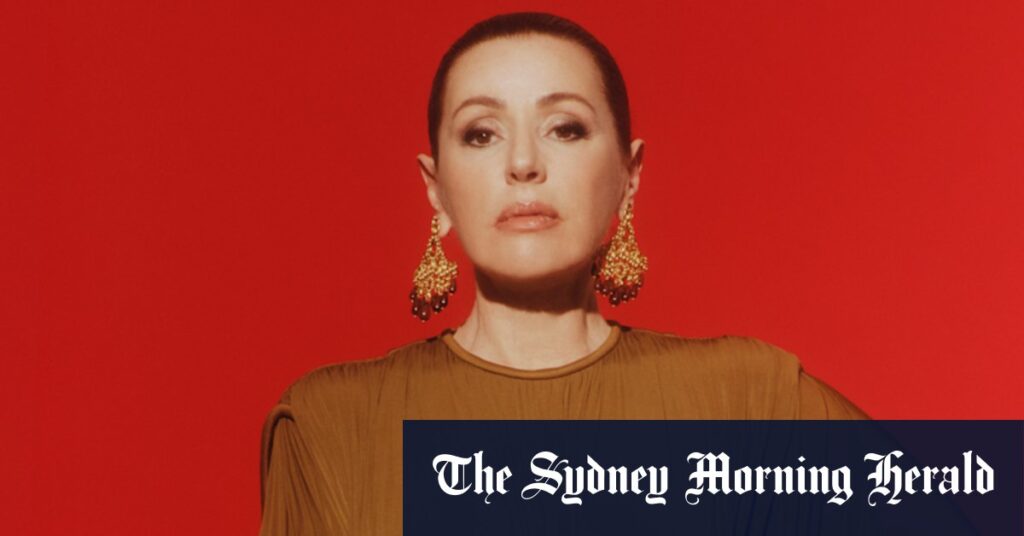
Without the aid of Google, TikTok, or even their CD collections, a generation of Australians can instantly recall the face and voice of singer Tina Arena. Her soft visage and expressive brown eyes, coupled with a powerful voice, have been etched into the public consciousness since she first appeared as “Tiny Tina” on the television variety show Young Talent Time in 1974. Arena’s rendition of ABBA’s “Ring Ring” captured the nation’s heart, marking the beginning of a remarkable career.
Over the past 50 years, Arena has evolved from a child star to a celebrated recording artist and musical theatre performer. Now, at 57, she is reflecting on her journey as she views a portrait by fashion photographer Georges Antoni. This portrait, set to be unveiled on September 5 at the National Portrait Gallery in Canberra, celebrates her five decades in the entertainment industry, joining the ranks of other iconic Australian performers.
A Journey of Self-Acceptance
In the quiet of the gallery’s storeroom, Arena gazed at the portrait that captured her essence. “I see my heritage, very strongly and very beautifully,” she remarked, acknowledging her Sicilian roots and upbringing in Melbourne’s Keilor East. “I see strength, softness, and acceptance. Just accepting that nothing is perfect, it doesn’t exist. It’s being happy with who I am, what I have done, and being a little softer, not so hard on myself.”
Her career spans from the early days on Young Talent Time to international success with her 1994 album Don’t Ask, which featured hits like “Chains” and “Sorrento Moon.” Arena has also shone on stage in roles such as Sally Bowles in Cabaret and Eva Perón in Evita. On a personal level, she is the mother of Gabriel, her 19-year-old son with former partner Vincent Mancini.
Challenges and Triumphs
Reflecting on her career, Arena admits she hasn’t always recognized herself in the myriad magazine covers and photographs. Yet, she is certain that Antoni’s portrait captures her true self. “Boom! Georges got it,” she said. “I know who I am at 57, nearly 58. If I don’t know who I am by now, we’ve got problems, right?”
Her journey has not been without challenges. Arena recalls the mixed emotions surrounding the success of Don’t Ask and her troubled relationship with her then-manager Ralph Carr. “I believed in that record,” she says, her voice still resonating with a strong Australian accent. “I didn’t know what that record was going to do to me emotionally, or where it would take me when I realized how humans can behave inappropriately.”
“I was exposed to things that I should never have been exposed to and had to navigate my way through all of it – betrayal, lack of transparency, inappropriate behaviour…”
Finding Solace and Recognition
Following the breakdown of her marriage, Arena found solace in Paris. There, she gained fame with audiences unfamiliar with “Tiny Tina,” notably through her duet “I Want to Spend My Lifetime Loving You” with Marc Anthony. Her success in France was solidified with the release of her first French-language single, “Aller Plus Haut,” and in 2011, she was awarded France’s Knighthood of the Order of National Merit.
Back in Australia, it took another five years for her to receive the Order of Australia for her contributions to the music industry and charitable causes. “Look, Australians really do suffer from the tall-poppy thing,” she observes. “I don’t think we inherently enjoy celebrating people’s success.”
Speaking Out and Looking Forward
Since returning to Australia, Arena has become more vocal about issues close to her heart. At the 2015 ARIAs, she criticized commercial radio for ageism, a stance she continues to champion. “Women, particularly assertive and strong women, are muzzled or put to the side,” she asserts. “There’s no room. You’re 40 years old, you’re not relevant any more. According to who?”
During the COVID-19 lockdowns, Arena was outspoken about the impact of restrictions on the arts community. Despite mixed responses, she remains undeterred by critics, following her mother’s advice to “always be elegant” and walk away from negativity. “You realize that a difference of opinion from the masses doesn’t make you a lesser person. It doesn’t make you less worthy.”
Her forthrightness was on display earlier this year at a concert in Melbourne, where she addressed disruptive audience members. “It’s not being outspoken, it’s just speaking up, and it’s defending my space,” she explained. This confidence marks a significant evolution from the young performer who once sank into a record company sofa, unsure of her place in the world.
As Arena continues to embrace her journey, she remains a testament to resilience and authenticity. Her story is one of growth, acceptance, and an unwavering commitment to her craft and herself.






